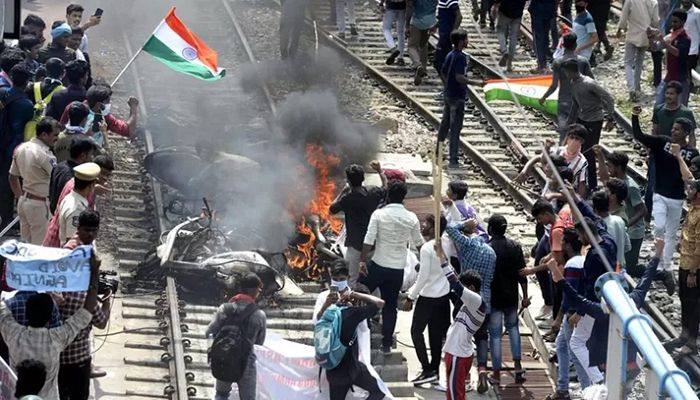
Desk Report
Publish: 20 Jun 2022, 04:29 pm

Protestors set vehicles on fire during a demonstration against the governments new Agnipath recruitment scheme for the army, navy, and air forces at a railway station in Secunderabad on June 17 || AFP Photo: Collected
Tens of thousands of job seekers have called for a shutdown in India to protest against a new army hiring plan which has sparked violence.
Some states shut down the internet and suspended train and bus services on Monday, reports BBC.
Protesters are demanding the rollback of the plan to hire soldiers on a fixed four-year term, saying it would shatter their dreams of a secure job.
They have taken to the streets, blocking roads and torching trains.
Several opposition political parties have given their support to the protests. But the government has refused to cancel the plan, though it has been trying to allay the fears of protesters.
Demonstrations against the plan began in the northern states of Uttar Pradesh and Bihar last week after Prime Minister Narendra Modi's government announced changes to how it would recruit soldiers for the armed forces.
But they have now spread to several other states, with thousands of young men attacking train coaches, burning tyres and clashing with security forces.
At least one person died, and several others were injured in the southern state of Telangana where protesters clashed with the police on Friday.
Ahead of the shutdown on Monday, several states announced precautionary restrictions - banning large gatherings, shutting schools and even suspending internet services in some districts. In the state of Jharkhand, school exams have been postponed. And in Bihar, authorities have cancelled 350 trains in the wake of violence.
Fears for future
Protesters say the government's plan to hire temporary soldiers will reduce their chances of getting coveted permanent military jobs, which guarantee fixed salaries and pensions.
They are demanding that the government scrap the new plan and maintain the policy that would offer them a career that usually lasts two decades and offers a pension at the end of it.
Young people in India's smaller towns and villages prepare for years to become soldiers in the armed forces as the job brings prestige, a regular income and for some, a way out of poverty.
The new Agnipath scheme is aimed at people aged between 17.5 and 21 years. It says that successful candidates will join the armed services for four years, after which only 25% of them will be retained.
The soldiers will go through training for six months and then will be deployed for three and a half years. During this period, they will get a monthly starting salary of 30,000 rupees ($384; £316), along with additional benefits which will go up to 40,000 rupees by the end of the four-year service.
The reform is aimed at cutting the army's expenditure on ballooning salaries and pensions - which consume more than half of its budget - and freeing up funds to modernise the forces. The government said this would also "enhance the youthful profile of the armed forces".
In a bid to pacify protesters, the federal government announced late on Thursday night that candidates aged up to 23 years could apply under the scheme in the first year.
On Sunday, the home ministry also said it would reserve 10% of vacancies in the paramilitary forces and the Assam Rifles, a unit in the Indian army, for those who finish the four-year term.
The government has also shared posts on social media, explaining the various opportunities it said would be available to short-term soldiers after they finish their stint. It said that police forces will be asked to accommodate those who successfully finish their four-year terms in the armed forces.
Critics of the plan say that it will weaken the armed forces and also increase unemployment rates in the country.
"It's a foolish move, one that could affect the efficiency of the security forces," said retired Major General Sheonan Singh.
"Saving money is good but it should not be done at the cost of defence forces. If you go to war with an experienced soldier, will a person with four years of training be able to replace him on his death? These things don't work like this."
But those who support the move say that such a plan was needed to make the forces more efficient.
Retired Maj Gen SB Asthana said the step would benefit the army as it would help modernise India's forces.
"It is difficult to train old people in modern technology. But this generation is more capable. This plan will give freedom to the army to keep the best 25% of the soldiers and let the rest go."
Subscribe Shampratik Deshkal Youtube Channel
© 2024 Shampratik Deshkal All Rights Reserved. Design & Developed By Root Soft Bangladesh